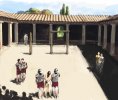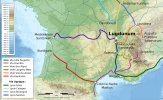Praefectus Praetorio
R.I.P. Brother of the Quill
It was well past the fifth hour, and the July sun was high in the sky, baking down on the dusty streets of Narbo. The stifling heat was oppressive on the little procession marching trans forum (across the central square) of Narbo and toward the castra (barracks). Gaius, going ahead with a martial bearing and his eyes focused dead ahead, seemed oblivious to the heat and his surroundings. The three newer recruits behind him strolled along with a less military gait and were more obviously reacting to the heat and the beautiful, almost-naked girl between them. They also were proud of the townsfolk's respectful (and lustful) stares as they turned to see the soldiers escorting a beautiful girl through the forum. Many identified Barb as a Goth and shouted insults at the barbarian. The assumption that the Goth must be a criminal was universal.
Without any apparent glance to the rear, the Centurion said, “acies propius adeste, Milites (military term – close ranks, best translated here as, ‘keep up.’) “Move the prisoner along.”
With her hands bound behind her and her legs hobbled, Barbara indeed had trouble keeping up with the Centurion's pace. The hot sun had caused a sheen of sweat to break out on her fair Northern skin, and the beginnings of a sunburn were showing on the parts usually covered. The brank made breathing difficult and her mouth even drier. She wondered how much longer she could go without vomiting.
Oblivious to her difficulty, the men jumped to action at their leader's command. The frontman jerked the lead, causing the noose to tighten. The man to her right swapped her rump hard with his right hand. Barb yelped and shuffled forward with quick little steps. Another jerk on the lead and a jab by the third soldier with his swordpoint into her buttcheek made the Goth scurry along to the laughter and derision of the onlookers.
In the auction room, Silva came up to Piso and Antonius and handed them each a bronze goblet of wine. Addressing Galerius, he apologized. "I am truly sorry how things turned out here, Antonius. The Quaestor is, of course, correct about the law. But I want to deal honestly with my customers. I and Lycus willingly refund you one-half the price." he handed the young man five solidi. “I hope you will not leave with hard feelings.”
Lucius burst out, “Well done, Septimus! No one could be fairer, eh, Galerius?”
“It is a fair gesture, bello praeconem,” Galerius said, taking a big drink of wine, “I bear no ill will." With that, the two men grasped each other's right hand in the Roman gesture of friendship and trust.
“If you have nothing else to do, Septimus,” said Lucius, would you care to join us? We are going to the castra to sample the pleasure of the Goth's body before the soldiers demolish it."
“I would like nothing better,” said Silva, joining the two as they went outside.
Without any apparent glance to the rear, the Centurion said, “acies propius adeste, Milites (military term – close ranks, best translated here as, ‘keep up.’) “Move the prisoner along.”
With her hands bound behind her and her legs hobbled, Barbara indeed had trouble keeping up with the Centurion's pace. The hot sun had caused a sheen of sweat to break out on her fair Northern skin, and the beginnings of a sunburn were showing on the parts usually covered. The brank made breathing difficult and her mouth even drier. She wondered how much longer she could go without vomiting.
Oblivious to her difficulty, the men jumped to action at their leader's command. The frontman jerked the lead, causing the noose to tighten. The man to her right swapped her rump hard with his right hand. Barb yelped and shuffled forward with quick little steps. Another jerk on the lead and a jab by the third soldier with his swordpoint into her buttcheek made the Goth scurry along to the laughter and derision of the onlookers.
In the auction room, Silva came up to Piso and Antonius and handed them each a bronze goblet of wine. Addressing Galerius, he apologized. "I am truly sorry how things turned out here, Antonius. The Quaestor is, of course, correct about the law. But I want to deal honestly with my customers. I and Lycus willingly refund you one-half the price." he handed the young man five solidi. “I hope you will not leave with hard feelings.”
Lucius burst out, “Well done, Septimus! No one could be fairer, eh, Galerius?”
“It is a fair gesture, bello praeconem,” Galerius said, taking a big drink of wine, “I bear no ill will." With that, the two men grasped each other's right hand in the Roman gesture of friendship and trust.
“If you have nothing else to do, Septimus,” said Lucius, would you care to join us? We are going to the castra to sample the pleasure of the Goth's body before the soldiers demolish it."
“I would like nothing better,” said Silva, joining the two as they went outside.







